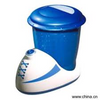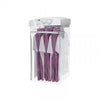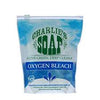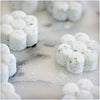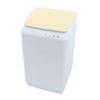HOLY GRAIL
Wrinkle Reduction Evades Detergent Researchers
MICHAEL MCCOY, C&EN NORTHEAST NEWS BUREAU
When Unilever launched Wisk with Wrinkle Reducer laundry detergent in 2000, it seemed as if the big household products company had found the Holy Grail: an ingredient that allows consumers to reduce or eliminate the need for ironing.
However, subsequent negative reviews by Consumer Reports magazine and various newspapers indicate that the Holy Grail has yet to be found. And, according to R&D executives at other leading consumer products makers, it isn’t likely to be discovered anytime soon.
J. Keith Grime, vice president of R&D for Procter & Gamble’s global fabric and home care organization, contends that, as yet, no effective detergent-based technology has been developed that can provide consumer-noticeable wrinkle reduction, at least in the dilute conditions typical of North American clothes washing.
Adding to the problem, Grime notes, is that consumers want to avoid the ironing process altogether, so antiwrinkling tends to be an all-or-nothing benefit. “As a result, attempts to introduce ‘reduced wrinkles’ or ‘ease of ironing’ as a benefit have tended to fall flat,” he says.
P&G has had some success with auxiliary products like its spray-on Downy Wrinkle Releaser. In detergents, Grime sees a more immediate challenge in adapting formulas to work with the new generation of fibers and textiles that wrinkle less.
Things are a little different in Western Europe, where ironing and line drying are more prevalent and detergent wash concentrations are significantly higher. There, in 2001, P&G launched Bold and Dash detergents that promise ease of ironing, as opposed to outright wrinkle reduction. Grime says the system used to deliver these effects is based primarily on clay and hydrophobically modified carboxymethylcellulose.
Indeed, wrinkle-related ingredients offered by specialty chemicals companies tend to tout ease of ironing. Ciba Specialty Chemicals, for example, markets a fabric-softener additive under the Tinotex name that is intended to make ironing easier.
Degussa’s Goldschmidt unit has introduced a series of silicone quaternaries for fabric softeners called Varisoft SQ. Terry A. Laine, Goldschmidt’s textile care business director in North America, says the new products can impart ease-of-ironing and wrinkle-reducing properties to fabrics.
And Kevin Beairsto, director of detergent marketing and technology development at Alco Chemical, says his firm has made inroads with its Alcoguard 1000 series of specialty polymers. Beairsto calls the polymers “synthetic starches” that can be incorporated into spray-starch-type products to make ironing easier and keep wrinkles from forming during wear.
Meanwhile, the search for the Holy Grail continues. Thomas Müller-Kirschbaum, head of product development and technology for Henkel’s laundry and home care business, says Henkel researchers have been looking for an effective wrinkle-reduction system for 10 years without success.
Müller-Kirschbaum acknowledges that other companies have launched products claiming wrinkle reduction. “Sometimes consumers see things if you only promise them,” he says. “Unfortunately, you won’t find it in the lab.” In the end, he adds, the poor market share for wrinkle-removing products bears out the laboratory findings.
Henkel is careful about promising effects that it can’t deliver, Müller-Kirschbaum says, particularly for its flagship Persil laundry detergent brand. And he is concerned about the long-term impact of making claims that aren’t readily perceivable by the buying public.
“This comes back as consumer frustration and could damage a future category,” he says. “If there is a breakthrough innovation in one or two years, you have to start again and say, ‘Now, it’s real.’ Consumers will answer, ‘I only believe this lie once.’ “

